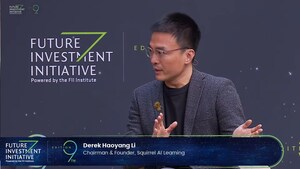
Squirrel AI Learning featured in article by Leiphone.com
Anxiety or modesty? Understand "European AI complex" from the German AI conference
Leiphone AI Technology Review
BERLIN, Aug. 5, 2019 /PRNewswire/ -- Squirrel AI Learning was recently featured in an article by Leiphone.com. Below is the full article:
May 16, 2019, Berlin, cloudy. The AI technology reporter, overcoming the jet lag of 6 hours, arrived at the entrance of the business hall of German Telecom in Franzosische Strase at about 10 o'clock local time. Soon, RISE OF AI, a grand event about AI technology, would start here.
"In the field of AI, China has invested hundreds of billions of dollars, while the German government invested only 0.5 million euros last year. This is the gap." After the event started, Fabian Westerheide, a German strategy expert, entrepreneur and venture capitalist in AI, made a speech entitled "Overview of AI industry in 2019". He is a representative in the German venture capital industry and has invested in Delivery Hero, a giant in the Internet industry in Europe.
In a brief introduction in the official website of the event, he claimed that he was "an avid science fiction enthusiast from an early age" and later turned "the enthusiasm for promoting science and technology and the progress of human society" into his mission. As one of his efforts to fulfill the mission, he initiated the first RISE OF AI event in 2014 attended by only 10 people. While now that figure has risen to 800.
Except the good-looking venue and the rich variety of food, RISE OF AI is not so different from other AI events attended by the reporters. The different attraction is those keynote speeches with strong European features, such as "Political Correctness of AI" (people-oriented, value-oriented, human-friendly), "Reflection Between the United States and China", speeches on conceptions to develop European AI, and the reflections on developing European/German AI (Germany is indeed a philosophical power!).
To enable readers to know more about the event, we are going to introduce our experience in the event with three keywords to provide some enlightenment by the following presentation.
Keyword 1: "China"
"If you look for a job, stay with them first. If you want to buy a company, look at them." In the opening speech, Fabian Westerheide summarized the AI industry in China in this way. "China" is undoubtedly one of the most prominent keywords of this event. Two of the four main speeches in the morning adopted the keyword of "China".
AI technology review focuses on "AI IN CHINA, EUROPE AND USA: A COMPARISON OF TECHNOLOGY AND RESEARCH", a speech in the morning, which was given by Dr. HANS USZKOREIT, Director of Science at the German Center for Artificial Intelligence Research who once worked in China for 2 years.
As to AI in China, this is what he views:
- First, China focuses on applying machine learning to computer vision, natural language processing, robotics, and big data analysis;
- Second, most studies follow the most popular deep learning approach at the moment.
- Third, a high volume of data.
He said that China did well in AI industrialization but had weak foundation in the basic research of AI compared with the United States and Europe. He demonstrated his opinion with a few diagrams:
Dr. HANS USZKOREIT thinks that AI research in China was more "pragmatic" because Chinese people often lacked patience and wished that "their efforts would pay off quickly". "They would not work on topics for tomorrow or the day after tomorrow," said Dr. HANS USZKOREIT.
He further explained that with the expansion of Tencent, Baidu and other Chinese tech giants, China had more urgent demand for basic research. Therefore, Dr. HANS USZKOREIT believed the great opportunity for Europe to cooperate more with China would come soon.
"Europe cannot compete with China in areas where China has been fully developed," added Dr. HANS USZKOREIT.
"Once the Germans decide to do something, such as AI, they will do it the best. Unlike Americans who tend to keep a high profile, German people will try their best to lay a solid foundation in that field," said Dr. Cui Yan, distinguished professor in Wu Yi University, vice principal of College of Innovation and Entrepreneurship and director of Sino-German Institute of Artificial Intelligence. He was invited to deliver a speech entitled "DIGITAL FUTURE - RESEARCH AND APPLICATION OF ARTIFICIAL INTELLIGENCE IN CHINA" at the main venue. He has been in Germany for 10 years and is quite familiar with Germany's attitude to research and development.
"They have been doing researches in the field of AI since 1980s, including the researches in data, algorithms, R&D iterations, product updates, etc. They do things in a quite solid way and are not easy to be affected by something else. They don't care what Google or Intel has done or is doing. The cycle of their research and development is quite long, maybe three, five or ten years. Before completing the defined project, they will not change the project process too much," added Dr. Cui Yan.
"Dr. HANS USZKOREIT said that the Chinese are a little impatient. How do you like his opinion?" asked the AI technology review reporter.
"It is easy for us to be patient. But what will patience bring us if we can't survive in certain field? The industrial base of Germany provides them with the patience by which they can develop an industry. Only with solid foundation can you do everything patiently."
Keyword 2: "Win-win"
Compared with other well-known international AI summits, RISE OF AI was so mediocre. It was hard to find Chinese representatives at the summit. The only Chinese enterprise representative at the summit was Squirrel AI Learning by Yixue Gorup, which was a surprise for me.
Dr. KP Thai, a data and learning scientist at Squirrel AI Learning was invited to deliver a keynote speech entitled "HOW AI CAN TRANSFORM THE EDUCATION INDUSTRY" in AI Applied Stage this morning. To put it simply, Squirrel AI believes that one of the biggest problems in traditional education is the lack of personalized teaching and counseling provided by high-quality teachers. Therefore they developed their own AI adaptive technology to solve this problem.
DR. KP THAI gave an in-depth introduction to the AI adaptive learning engine built by Squirrel AI, which makes use of many latest innovations in AI technology, including Probabilistic Knowledge State (PKS) model, Multi-model Integrated Behavior Analysis (MIBA) system, Natural Language Processing and their unique knowledge components, which can provide children with an engaging learning experience.
"These technologies are actually very easy to understand: personalized teaching," said Dr. KP THAI when explaining how to understand Squirrel AI Learning's adaptive learning. "Squirrel AI System analyzes the advantages and disadvantages of students in learning through data segmentation and provides feasible and immediate suggestions for teachers. Then the system will provide continuous formative assessment for teachers in real time to relieve the burden of teachers in evaluation and management, and finally form a positive cycle and provide corresponding guidance, practice, feedback and ability evaluation for each student."
"We are curious about what feedback these European participants have given you privately?" asked the AI technology review reporter.
"These European participants are very modest. They think that AI in Europe is not as brilliant as that in the United States and China. Even so, they still want to be engaged in the development of AI. However, they do not want to just be a winner in the battle. Instead, they hope to solve problems in health, education and other fields through AI. Of course, they want to do it in a more secure way that protects privacy. Some speakers at the venue have expressed their recognition of us. They believe that AI + education will surely be the future and they are surprised at our current growth rate. They often ask when Squirrel AI Learning will enter the European market and they hope to have some cooperation with us," replied Dr KP THAI.
"RISE OF AI is a relatively small meeting. Why does Squirrel AI Learning choose to attend it?" asked the AI technology review reporter.
"Squirrel AI Learning's adaptive technology has been evolving. We hope that the system can better predict students' proficiency in learning, and better identify cases where students misunderstand what they are learning. To do all these well is actually a big project. So we would like to establish partnerships with top institutions in research. For example, we have recently established a research laboratory with Carnegie Mellon University mainly for the research and development of classroom projects. In addition, we have established cooperative relations with many research institutions around the world. In short, we hope to get more cooperation opportunities by attending the event. One benefit you can enjoy by working with us is that we will provide a large quantities of cases and data, and tell you our research directions."
Dr KP THAI paused and then continued to add, "The AI technology has not been fully exploited in the education industry. Many problems in the industry can undoubtedly be solved through AI. However, many people have no idea of such possibility."
Keyword 3: "AI Made in Germany"
Some of the speeches delivered at Future Stage did not impress the reporter. Because AI in China has been developing so fast that when hearing speeches with certain topics, the reporter could not help but think that there was a long way to go for Europe in the field of AI.
Even the host quipped at the meeting that outside the venue, no other Europeans knew anything about AI.
In the opening speech delivered in the morning, Fabian Westerheide summarized the reasons for the lag in AI development in Europe:
- Fewer start-ups
- Imperfect venture capital system
- Backward political agenda
When seeing such speeches as "AI MADE IN GERMANY - RESPONSIBLE AI AND AMPLIFYING HUMAN INGENUITY" and "DEBATE: WHAT DO WE NEED FOR 'AI MADE IN GERMANY'?" in the agenda at Future Stage that tried to justify AI in Germany, the reporter was quite surprised. In particular, the later debate (in fact, it was more like a round-table conference) even invited members of the German Parliament and the AI committee to discuss with each other.
The debate was quite informative. The reporter summarized it into the following key points (personal opinions, for reference only):
- Be wary of the intentions to label German AI with "super ethical".
- The absence of political management has hindered the development of AI, which is even legitimized by Ethical Framework. Ethical Framework is necessary but it should not deny the development AI in any possible ways.
- There should be no "bias" against any science and technology projects in any specific country. All evaluation indicators should be based on scientific standards.
Many people in the industry are requesting politicians to make compromise, hoping that these politicians will formulate more favourable policies that facilitate the development of AI industry. However, the politicians just respond to these requests in a perfunctory manner.
Since understanding these speeches requires in-depth understanding of the scientific and technological and political climate in Europe, no further interpretation will be made so as not to mislead readers.
Summary
RISE OF AI is like a window through which we can catch a glimpse of the development of AI in Europe. The reason why the reporter uses the phrase "catch a glimpse of" is that there were many interesting speeches in other venues, but due to time limit, the reporter didn't access those speeches, and as a result, the reporter has not achieved a comprehensive understanding of the development of AI in Europe.
Despite that, we can still detect the position of Europe between the pressures of US and China and understand that Europe is advancing its AI industry in a slow yet methodical way, the way European people do everything else.
SOURCE Squirrel AI Learning







Share this article